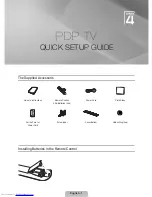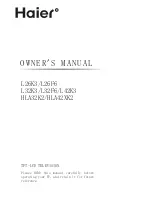
Circuit Descriptions, Abbreviation List, and IC Data Sheets
EN 111
A02U AA
9.
9.8
Control
9.8.1
Introduction
The MIPS processor within the ADOC performs the control of
the complete SALSA system. This part of the document will
examine the functions that enable the MIPS to operate and
control the remainder of the SALSA system.
Some control features:
•
MIPS1910 processor (MIPS).
•
Embedded SRAM.
•
External Bus Interface Unit (EBIU) for external memory
access.
•
SDRAM Interface.
•
Interrupt Controller.
•
Power and Clock management.
•
General Purpose I/O (GPIO).
•
Analog to Digital conversion.
•
Two x I2C master/slave.
•
Two x General Purpose Timers.
•
UART.
•
Two x Multi-standard VBI Data Capture Unit.
•
EJTAG (for debug and boundary scan functions).
•
Remote Control (Infra Red) pre-processing.
•
Graphics.
Figure 9-20 ADOC control block diagram
9.8.2
Internal Bus Structure
PI Bus
The Peripheral Interconnect (PI) bus connects all of the
functional blocks within the ADOC device. Physically it is split
into four distinct sections. These are referred to as:
•
Fast PI Bus.
•
Slow PI Bus.
•
Video PI Bus.
•
Sound PI Bus.
The individual segments of the PI bus are interconnected via
PI-PI bridges. When several devices are connected to a bus
system section only one of these may have control (ownership)
of the bus section at any instant in time. The device that has
control is referred to as the bus master, the remaining devices
are referred to as slaves. Each bus segment section has a Bus
Control Unit (BCU), which allocates bus ownership to the
various modules that are capable of being bus masters. A bus
master may have ownership of one or more sections of the PI
bus.
Extension Bus Interface Unit
The Extension Bus Interface Unit (EBIU) allows various types
of memory (ROM/FLASH/SRAM) to be attached to the ADOC
IC and must therefore be configured per memory type (in terms
of chip select lines, bus width used, and access times). This
enables the hardware of the EBIU to correctly address the
external memories and apply the correct number of wait states.
9.8.3
Microprocessor Reset
The reset of the device is split between three functions:
•
Power-On-Reset (POR). Output is fed to the Power Clock
Reset (PCR) block generating a Hard reset (all functions
reset).
•
PCR. In simplified terms two outputs are available:
–
Hard reset, all blocks within ADOC are reset.
–
Soft reset, a limited number of blocks within the control
core are reset.
•
GP registers are used to allow software control of the reset
to certain blocks within ADOC.
9.8.4
External Bus Structure
I2C Bus
The system has two system I2C buses; one for the devices on
the SSB and the other for the devices used in the external
modules.
•
The I2C-1 system bus, comprises of SCL and SDA, is used
to control all the I2C devices on the LSP (the main tuner)
and other I2C devices connected to other external panels
(PIP Front-End demodulation IC, PIP tuner, etc.). The I2C-
1 is a 100 kHz bus and is called as "slow" bus. It is
connected to the +5V supply. All these devices are
powered down in the Standby mode.
•
The I2C-2 system bus, comprises of SCL2 and SDA2, is
used to control all the I2C devices (MPIF, 3D-Comb, NVM,
etc.) present on the SSB. The I2C-2 is a 400 kHz bus and
is called as "fast" bus. It is connected to the +3.3V supply.
9.9
Protections
For a detailed description, see chapter 5 "Service Modes, Error
Codes, and Fault Finding".
9.10
Software Upgrading
In this chassis, you can upgrade the software via ComPair.
This offers the possibility, to replace the entire SW image
without having to remove the flash-RAM from its socket. You
can find more information on how this procedure works in the
ComPair file. It is possible that not all sets are equipped with
the hardware, needed to make software upgrading possible. To
speed up the programming process, the firmware of the
ComPair interface can be upgraded. See Chapter "Service
Modes ..." paragraph "ComPair" - "How To Order" for the order
number.
CL 36532058_075.eps
071003
MIPS
EBIU
SRAM
128KB
PI-PI
BRIDGE
GFX
GEN
GPIO
I2C
A/D
ADC
TIMER
GFX
FAST
PI_BUS
SLOW
PI_BUS
1581
2582
2581
KEYBOARD
FRONT-DETECT
STATUS1_PIP-AFT-50-60HZ
SEL-SHVS-RR_STATUS2
LIGHT-SENSOR
RC5
SDA0
SCL0
SDA1
SCL1
SEL-IF-LL
SOUND-ENABLE
SEL-2FH-SRC_STATUS3
DEGAUSS
STANDBY
MPIF-IRQ
W
E
G
VDDE
7790
SEL-2FH-SRC_STATUS3
DTV_EXPENSION
COMM_LINE (SCART)
F_REF
ADOC-uP & CONTROL
POR_FLASH
B8
B18
B4
B1
B4
(FROM 0223)
B18
7300-A,C,E & K
ADC1
ADC4
P2-6
P3-0
ADC3
ADC0
ADC5
P0-7
P0-3
P0-1
P3-2
P0-6
P0-4
P2-4
P2-2
P0-5
P1-1
P1-0
P1-3
P1-2
MPIFCLK
XOUT
XIN
(SCART)
FOR 2FH I/P or SCART-3
BUS
A1..A21 D0..D1
5
VDD
MEMORY INTERFACE
B7
9,37
VDDQ
43
FLASH
RESET_
FLASH_RST
POR_FLASH
FLASH_RST
16
RP
ADC2
VDDE
VDDCO
ADC-
VDDA
XVDD
5570
5583
7525
W C_
5
6
7
VDDE
8
P1-5
SCL
SDA
NVM
VPP
SDM
4565
4564
RES
SYSTEM
RESET
(50ms)
7581
VDDE
+5V2
3582
3590
3583
3586
1
5
4
15
RB
RB
RB
53
P0-2








































